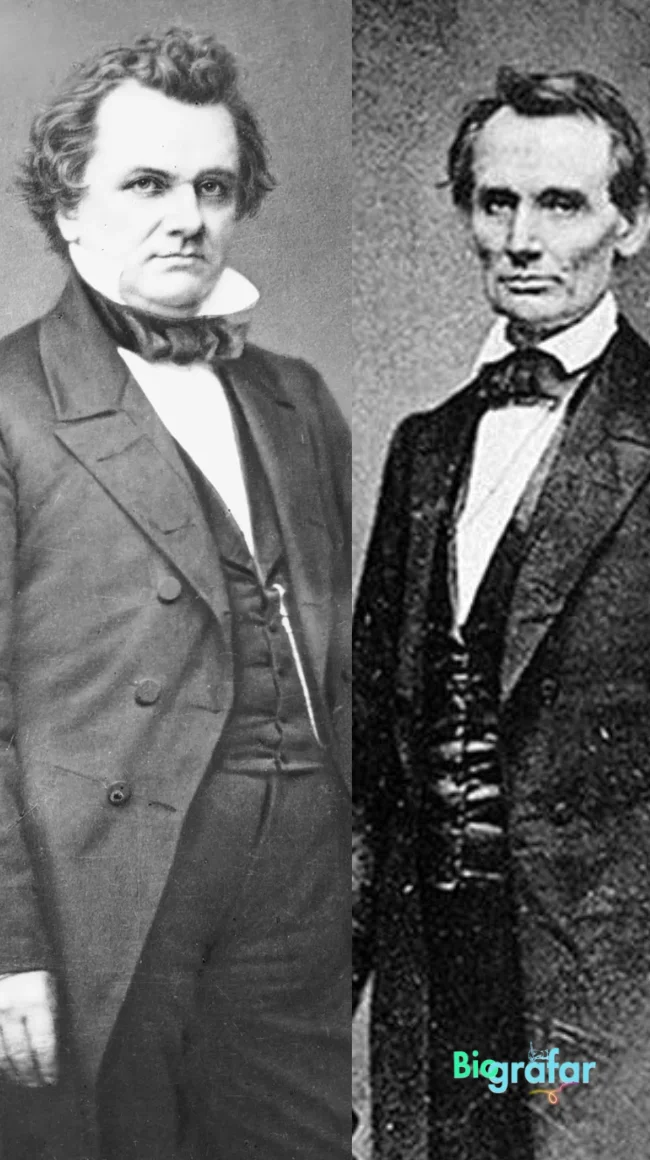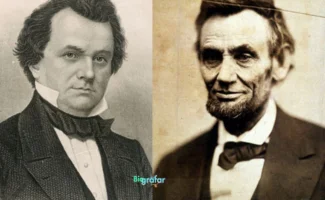Battleground Orators: Abraham Lincoln vs Stephen A. Douglas
Introduction
Embarking on this historical journey, we navigate the corridors of time, offering a succinct yet comprehensive overview of the tumultuous historical landscape that provided the backdrop for the monumental clash between Abraham Lincoln and Stephen A. Douglas. In this brief exploration, we unveil the stage for the political theatrics that unfolded during a pivotal period in American history.
As the curtains rise, the spotlight focuses on the central figures in this political drama—Abraham Lincoln and Stephen A. Douglas. Their entrances onto the historical stage were not mere chance occurrences; instead, they were pivotal moments that would go on to shape the trajectory of a nation. We extend an invitation to the audience to step into the shoes of these formidable characters, each harboring unique aspirations, unwavering convictions, and distinct visions for a divided America. This introductory glimpse sets the tone for readers to immerse themselves in the intricacies of the Lincoln-Douglas debates, an arena where the destiny of a nation dangles delicately in the balance.
This crafted introduction seeks to infuse a human touch into the historical narrative, bringing to life the individuals who played central roles in shaping the course of American history. By inviting readers to empathize with the hopes, beliefs, and conflicting visions of Lincoln and Douglas, we set the stage for a nuanced exploration of a critical period, fostering a connection between the audience and the pivotal moments that defined the fate of a nation.
Abraham Lincoln: A Self-Made Leader
Abraham Lincoln's extraordinary odyssey from humble origins to one of America's most esteemed orators underscores his intellectual prowess, unwavering determination, and a moral compass that would guide a nation. Born into modest circumstances in a log cabin in Hardin County (now LaRue County), Kentucky, in 1809, Lincoln's early life bore the weight of hardship and a dearth of formal education. Driven by an insatiable curiosity, Lincoln took his education into his own hands, delving into books and legal texts to unravel the intricacies of law and rhetoric. His entry into the political arena commenced with his election to the Illinois State Legislature in 1834, and later, a single term in the U.S. House of Representatives from 1847 to 1849. These experiences served as crucibles for honing his skills as a persuasive orator and astute thinker. However, it was Lincoln's moral convictions, particularly his fervent opposition to the expansion of slavery into new territories, that thrust him onto the national stage. The passage of the Kansas-Nebraska Act in 1854, which allowed territories to determine the slavery question through popular sovereignty, deeply troubled Lincoln. His stance against the spread of slavery wasn't confined to a legal or political understanding; it was rooted in a profound belief in the inherent equality of all individuals


Key Themes of the Lincoln-Douglas Debates:
- Slavery’s Morality:
Lincoln’s Perspective:
Abraham Lincoln’s convictions on the morality of slavery were deeply rooted in his belief that it contradicted the foundational principles of the United States. With fervor, he argued against the expansion of slavery into new territories, asserting it as a moral evil that violated the essence of the Declaration of Independence. In iconic speeches like the “House Divided,” Lincoln underscored his view that a nation divided between free and slave states could not endure.
Douglas’s Perspective:
In contrast, Stephen A. Douglas, though not a proponent of slavery, embraced a pragmatic stance. He advocated for popular sovereignty, asserting each state’s right to determine its position on slavery through democratic processes. While acknowledging the moral complexities surrounding slavery, Douglas believed that democratic resolutions at the state level were the most effective means. His emphasis on local self-determination underscored his approach to addressing the issue.
- Popular Sovereignty:
Douglas’s Advocacy:
Stephen A. Douglas staunchly championed popular sovereignty, contending that residents in each state or territory should independently decide whether to allow or prohibit slavery. Aligned with the Democratic Party’s platform, Douglas saw this approach as a democratic solution to the slavery debate, aiming to maintain peace and harmony by letting residents shape their own destinies through the ballot box.
Lincoln’s Critique:
Abraham Lincoln, however, raised ethical concerns about the application of popular sovereignty, particularly in territories where fundamental human rights were at stake. He questioned the morality of subjecting issues as fundamental as slavery to majority rule, arguing that principles of justice and equality should not be subject to popular vote.
The Lincoln-Douglas Debates: A Clash of Titans
In the crucible of the summer of 1858, the political arena in Illinois transformed into a battleground for a clash of ideologies and oratorical prowess as Abraham Lincoln and Stephen A. Douglas locked horns in a series of seven debates. These monumental debates, echoing through various towns across the state, would etch themselves into the annals of American political history, leaving an indelible mark on the nation's trajectory. 1. The Setting: Against the backdrop of a deeply divided nation grappling with the specter of slavery, the debates unfolded. The reverberations of the Kansas-Nebraska Act and the looming question of whether new territories would embrace or reject slavery set the stage for a symbolic and crucial confrontation. The Illinois Senate seat became the epicenter of this ideological clash, symbolic of the broader struggle gripping the United States. 2. The Topics: At the core of these debates lay the pivotal question of slavery's expansion into the western territories. Abraham Lincoln, representing the newly formed Republican Party, staunchly opposed the encroachment of slavery. In stark contrast, Stephen A. Douglas, a Democrat, championed popular sovereignty as the panacea to the crisis, advocating for territories to decide their stance on slavery through democratic means. 3. The Format: The debates adhered to a meticulously structured format. Each candidate was allotted an hour to articulate their position, followed by an hour and a half for a rebuttal, and finally, a 30-minute response from the initial speaker. This format facilitated a thorough exploration of their convictions, allowing for a nuanced understanding of their beliefs on the complex issue at hand. 4. Lincoln's Oratory: Abraham Lincoln's speeches during these debates bore the hallmark of his distinctive eloquence and moral clarity. Grounded in the belief that slavery not only violated human rights but also imperiled the principles of the Declaration of Independence, Lincoln's words resonated with power and simplicity. His oratory skillfully appealed to the nation's moral conscience, leaving an indelible impact on audiences. 5. Douglas's Oratory: Stephen A. Douglas, the seasoned political veteran, brought a more polished and strategic oratorical style to the fore. Defending popular sovereignty as a democratic solution, Douglas emphasized the importance of local self-determination in resolving the slavery question. His eloquence lay in his ability to delicately navigate the complex balance between preserving the Union and addressing the divisive issue of slavery.
Stephen A. Douglas: The Little Giant of Illinois
In stark contrast to Lincoln’s humble beginnings, Stephen A. Douglas, born in Brandon, Vermont, in 1813, emerged from a more privileged background. Douglas’s political ascent unfolded in Illinois, where he swiftly ascended the ranks, securing the positions of Secretary of State and Supreme Court justice before the age of 30. Endowed with a charismatic personality and sharp political acumen, Douglas earned the moniker “The Little Giant.”
Douglas’s political philosophy centered on the principle of popular sovereignty, a concept he championed as a compromise amidst the escalating tensions over slavery. Proposing that residents of a territory, rather than the federal government, should decide the fate of slavery, Douglas ardently believed this approach would sustain peace and unity, permitting each state to shape its own destiny.
The tales of Lincoln and Douglas, weaving through disparate backgrounds and philosophies, converge at the brink of a nation embroiled in ideological and moral strife. Their narratives unfold against the canvas of a nation grappling with its identity, laying the foundation for the impending clash in the Lincoln-Douglas Debates.
Legacy of the Lincoln-Douglas Debates:
National Recognition for Lincoln:
- Despite his defeat in the 1858 U.S. Senate race, Abraham Lincoln’s participation in the debates thrust him into the national spotlight. His powerful oratory, moral clarity, and staunch opposition to the expansion of slavery resonated with an increasingly anti-slavery sentiment in the North. Lincoln’s reputation as a principled leader transcended the borders of Illinois, setting the stage for his victorious presidential campaign in 1860.
Lincoln’s Presidential Victory:
- Serving as a pivotal juncture in Lincoln’s political career, the debates contributed significantly to his nomination as the Republican Party’s candidate in the 1860 presidential election. The ensuing victory marked a historic moment, culminating in Lincoln’s inauguration as the 16th President of the United States. The Lincoln-Douglas Debates played a critical role in shaping the public’s perception of Lincoln as a leader capable of steering the nation through turbulent times.
Shifting Political Landscape:
- The debates left an indelible mark on the American political landscape. The discussions, particularly centered around the moral dimensions of slavery, became central to national discourse. The Republican Party, buoyed by its prominence in the North, gained momentum, while internal divisions over slavery plagued the Democratic Party. This realignment of political forces set the stage for the impending Civil War.
Insights into Leadership Styles:
- The debates offered valuable insights into the characters and convictions of both Lincoln and Douglas. Lincoln’s speeches showcased moral clarity, a commitment to equality, and an ability to articulate complex issues for a broad audience. Douglas, a skilled orator and political tactician, demonstrated the challenges of straddling the divide between North and South. The debates became a rich case study in leadership, illustrating diverse approaches to addressing the nation’s pressing issues.
Prelude to the Civil War:
- Considered a precursor to the Civil War, the debates exposed the deep-seated tensions surrounding slavery. The stark disagreements between Lincoln and Douglas hinted at the inability to find a morally acceptable solution, foreshadowing the violent conflict that would engulf the nation in the coming years. The debates’ legacy lies in their role as a herald to a defining chapter in American history.
Enduring Historical Significance:
- The Lincoln-Douglas Debates are etched in American political history as a transformative moment. Their enduring significance extends beyond immediate political outcomes, offering lessons on leadership, the influence of moral convictions in politics, and the repercussions of failing to reconcile irreconcilable differences. The debates continue to be a subject of study, resonating with the complexities of a nation on the brink of a seismic shift.
Conclusion:
In the pages of American political history, the names Lincoln and Douglas are inked with the fervor of impassioned speeches and unwavering convictions. Their words, resonating across time, not only left an indelible mark on the immediate political stage but also cast shadows on the underlying tensions that would later erupt into the cataclysmic conflict of the Civil War. The Lincoln-Douglas Debates, akin to a poignant ballad, stand as a stark reminder of the profound influence articulate and principled leaders can wield over a nation.
The clash of ideas, the moral arguments articulated with eloquence, and the inability to find common ground during these debates served as ominous signs, foretelling the challenges that would propel the United States perilously close to a national rupture. In this regard, the debates stand as a testament to the enduring potency of language, conviction, and the intricate dance between political discourse and the unfolding currents of history.
Beyond the podiums and speeches, the Lincoln-Douglas Debates transcend their temporal confines, resonating as a cautionary narrative about the fragility of a nation torn by irreconcilable differences. The leaders’ failure to bridge the moral and ideological chasm laid bare the simmering tensions that would erupt into the seismic turmoil of the Civil War. Reflecting on this pivotal chapter, we are reminded that the legacy of these debates lies not just in the uttered words of Lincoln and Douglas but in the profound impact their discourse had on the fate of a nation navigating the crossroads of its own narrative.